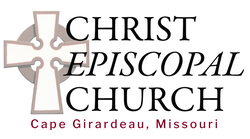Weekly Liturgy booklets
|
--Hymns of the Service--
Processional Hymn: #404, We Will Extol You, Ever Blessed Lord
Sequence Hymn: LEVAS #146, Break Thou Bread of Life Offertory Hymn: #335, I am the Bread of Life Communion Hymn: #321, My God Thy Table Now is Spread Recessional Hymn: #690, Guide Me O, Thou Great Jehovah |
July 28th, 2024
|


